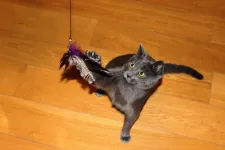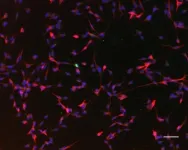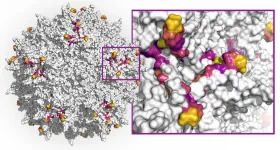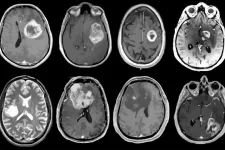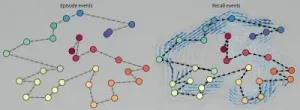Recommendations for regional action to combat marine plastic pollution
IASS study
2021-02-11
(Press-News.org) Millions of tonnes of plastic waste find their way into the ocean every year. A team of researchers from the Institute for Advanced Sustainability Studies (IASS) in Potsdam has investigated the role of regional ocean governance in the fight against marine plastic pollution, highlighting why regional marine governance should be further strengthened as negotiations for a new global agreement continue.
In recent years, images of whales and sea turtles starving to death after ingesting plastic waste or becoming entangled in so-called ghost nets have led to a growing awareness of the crisis of marine plastic pollution. The total number of plastic bags, fishing equipment, disposable bottles and other plastic items currently in the ocean is unknown. However, studies show that plastic waste has become ubiquitous, from the Arctic to the Antarctic, from the surface to the bottom of the deep sea. It comes in all shapes and sizes - from vast fishing nets to tiny particles of microplastic.
Various agreements have been reached at the national, regional and global levels to tackle the issue. However, these measures have failed to effectively address the challenges around marine plastic pollution, write the authors of the new report published by the IASS - "Stronger together: The role of regional instruments in strengthening global governance of marine plastic pollution". More comprehensive measures and systemic changes are urgently needed to reduce and prevent marine plastic pollution. The issue is all the more urgent as the amount of plastic manufactured globally is expected to double in the next ten to fifteen years.
The challenges
According to the report, the key challenges for the further development of existing initiatives to combat plastic waste in marine regions such as the Baltic Sea, the Pacific or the Caribbean include:
1) a great variation in the level of implementation of measures to address plastic pollution,
2) large differences in the monitoring and assessment of relevant data,
3) deficits in the implementation of multi-stakeholder approaches, and
4) a widespread lack of engagement with the private sector.
Improving private sector engagement and data collection
According to the report, private sector engagement is crucial to reducing the flow of plastic waste into the sea. The authors recommend that regional working groups be established to foster cooperation. "Working groups would provide a forum for organizations that are committed to marine conservation to engage with private companies and discuss how the discharge of plastic waste into the sea can be prevented by, for example, using alternative materials in manufacturing or improving waste management systems," says IASS researcher and lead author Nicole Wienrich. Measures should be tailored towards establishing a circular economy with a waste hierarchy based on the principle of "Reduce, Reuse, Recycle". A global agreement could establish common goals and minimum standards.
The report also highlights the need to improve data collection around marine plastic pollution. Various organizations maintain records on the extent of plastic waste flows into the ocean. "The lack of common standards and methods for data collection makes it difficult to draw comparisons across data sets and reduces their utility," explains IASS researcher Laura Weiand, who contributed to the study. Regular and long-term monitoring would be necessary to detect differences in the nature and volume of plastic waste flows. Only then could organizations determine whether measures are successful and have the desired effect. A global agreement to address the issue of marine plastic pollution could establish a common framework for data collection and assessment.
Innovative methods should be used to collect data on marine plastic pollution. Citizen science projects involving local populations could also help to collect the necessary data. In addition, drones, unmanned aircraft and satellite images could all be used to simplify data collection and provide insights on waste volumes on remote areas such as the high seas.
Regional initiatives complement future global agreement
Regional organizations provide a vital opportunity to address the issue of marine plastic pollution at the ecosystem level. They can also facilitate the development and implementation of solutions that are tailored to address the challenges, needs and characteristic features of different regions and affected countries. They also create opportunities to exceed the standards set by a new global agreement with ambitious regional agreements which can inspire further action around the world.
As negotiations for a global agreement continue, the team of authors recommends that regional cooperation to prevent marine plastic pollution be strengthened further - not least because these negotiations could well continue for several years. "We can't wait that long and simply accept the status quo - this problem is too big and too urgent," says Sebastian Unger, Research Group Leader at the IASS.
INFORMATION:
ELSE PRESS RELEASES FROM THIS DATE:
2021-02-11
Domestic cats are a major threat to wild species, including birds and small mammals. But researchers reporting in the journal Current Biology on February 11 now have evidence that some simple strategies can help to reduce cats' environmental impact without restricting their freedom. Their studies show that domestic cats hunt less when owners feed them a diet including plenty of meat proteins. Equally, it helps to play with them each day in ways that allow cats to mimic hunting.
"While keeping cats indoors is the only sure-fire way to prevent hunting, some owners ...
2021-02-11
Domestic cats hunt wildlife less if owners play with them daily and feed them a meat-rich food, new research shows.
Hunting by cats is a conservation and welfare concern, but methods to reduce this are controversial and often rely on restricting cat behaviour in ways many owners find unacceptable.
The new study - by the University of Exeter - found that introducing a premium commercial food where proteins came from meat reduced the number of prey animals cats brought home by 36%, and also that five to ten minutes of daily play with an owner resulted ...
2021-02-11
Cambridge, MA - February 11, 2020 - Dyno Therapeutics, a biotech company applying artificial intelligence (AI) to gene therapy, today announced a publication in Nature Biotechnology that demonstrates the use of artificial intelligence to generate an unprecedented diversity of adeno-associated virus (AAV) capsids towards identifying functional variants capable of evading the immune system, a factor that is critical to enabling all patients to benefit from gene therapies. The research was conducted in collaboration with Google Research, Harvard's Wyss Institute for Biologically Inspired Engineering and the Harvard Medical School laboratory of George M. Church, Ph.D., a Dyno scientific co-founder. The publication is entitled "Deep diversification ...
2021-02-11
Natural compounds found in apples and other fruits may help stimulate the production of new brain cells, which may have implications for learning and memory, according to a END ...
2021-02-11
(Boston) -- Adeno-associated viruses (AAVs) have become promising vehicles for delivering gene therapies to defective tissues in the human body because they are non-pathogenic and can transfer therapeutic DNA into target cells. However, while the first gene therapy products approved by the Federal Drug Administration (FDA) use AAV vectors and others are likely to follow, AAV vectors still have not reached their full potential to meet gene therapeutic challenges.
First, currently used AAV capsids - the spherical protein structures enveloping the virus' single-stranded DNA genome which can be modified to encode therapeutic genes - are limited in their ability to specifically hone in on the tissue affected by a disease and their wider distribution throughout ...
2021-02-11
Glioblastoma is among the most aggressive and devastating of cancers. While rare compared with other cancers, it's the most common type of brain cancer. Even with intensive therapy, relatively few patients survive longer than two years after diagnosis, and fewer than 10% of patients survive beyond five years. Despite extensive studies focused on genomic features of glioblastoma, relatively little progress has been made in improving treatment for patients with this deadly disease.
Now, a new study led by Washington University School of Medicine in St. Louis, Pacific Northwest National Laboratory, Case Western Reserve University and the National Cancer Institute (NCI) of the National Institutes of Health (NIH) has revealed a detailed map of the genes, ...
2021-02-11
What The Study Did: This observational study assessed CRISPR-based methods for screening to detect SARS-CoV-2 among asymptomatic college students.
Authors: Carolina Arias, Ph.D., of the University of California, Santa Barbara, is the corresponding author.
To access the embargoed study: Visit our For The Media website at this link https://media.jamanetwork.com/
(doi:10.1001/jamanetworkopen.2020.37129)
Editor's Note: The article includes funding/support disclosures. Please see the article for additional information, including other authors, author contributions and affiliations, conflict of interest and financial disclosures, and funding and support.
INFORMATION:
Media advisory: ...
2021-02-11
What The Study Did: Changes in otolaryngology surgical volumes in the United States early on in the COVID-19 pandemic are described in this study.
Authors: Anirudh Saraswathula, M.D., M.S., of Johns Hopkins University School of Medicine in Baltimore, is the corresponding author.
To access the embargoed study: Visit our For The Media website at this link https://media.jamanetwork.com/
(doi:10.1001/jamaoto.2020.5472)
Editor's Note: Please see the article for additional information, including other authors, author contributions and affiliations, conflict of interest ...
2021-02-11
What The Viewpoint Says: How pandemic-related disruptions may adversely impact progress toward a gender-balanced workforce in academic oncology is described in this article, which also offers possible solutions to mitigate the problem in this specialty.
Authors: Reshma Jagsi, M.D., D.Phil., of the University of Michigan in Ann Arbor, is the corresponding author.
To access the embargoed study: Visit our For The Media website at this link https://media.jamanetwork.com/
(doi:10.1001/jamaoncol.2020.7681)
Editor's Note: The article includes conflicts of interest disclosures. Please see the article for additional information, including other authors, author contributions and affiliations, conflict of interest and financial disclosures, and funding and support.
INFORMATION:
Media ...
2021-02-11
Your brain is constantly evaluating which aspects of your experiences to either remember for later, ignore, or forget. Dartmouth researchers have developed a new approach for studying these aspects of memory, by creating a computer program that turns sequences of events from a video into unique geometric shapes. These shapes can then be compared to the shapes of how people recounted the events. The study provides new insight into how experiences are committed to memory and recounted to others. The results are published in Nature Human Behavior and were based on how people remembered the experience of watching an episode of Sherlock, a BBC television show.
"When we represent experiences and memories as shapes, we can use the tools ...
LAST 30 PRESS RELEASES:
[Press-News.org] Recommendations for regional action to combat marine plastic pollution
IASS study
